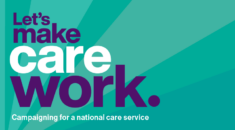UNISON Cymru/Wales has welcomed today’s announcement by the Welsh government that care workers in the country are to receive a bonus of £1,000 in April, alongside the introduction of the real living wage.
However, the union has warned that more needs to be done if care workers are to be encouraged to stay or come into the sector and has voiced disappointment that neither the one-off payment nor the introduction of the real living wage are being made to non-care staff.
The payment will be £1,487 before tax and national insurance and is being made to registered care workers who will also begin to receive the foundation living wage (real living wage) from April this year.
Mark Turner, UNISON’s care lead in Cymru/Wales, explained that the figure has been calculated in order to ensure that care workers should receive a net sum of £1,000 in their pay packets.
“It’s a one-off payment that was originally referred to in some discussions as a ‘bridging’ payment for those waiting for the real living wage to be implemented,” he says.
This is possible because there was some money available that either had to be spent before the end of the financial year or be returned to the chancellor.
Mr Turner says that the Welsh government “is responding to union and employer pressure because of the serious crisis in staffing within the care sector, and it’s hoped that this may encourage care workers who are under pressure to remain and may even tempt some who’ve left to work in sectors like retail and hospitality to return.
“UNISON was initially not in favour of a ‘retention’ payment, since there have been other single payments and we argued that sustainable change was what was needed.
“However, since the announcement of the implementation of the manifesto commitment [to the real living wage], this will be seen as a welcome addition by struggling care workers.”
UNISON has been arguing for the early implementation of fair work recommendations, such as a unified pay and progression structure, which will offer the same rates of pay, dependent on role, experience and skills.
Workers will also have an improved voice, with employers giving access to trades unions, and a sectoral collective bargaining unit, where ongoing pay and poor conditions issues can find negotiated resolutions.
UNISON has been working alongside Welsh government, the GMB, RCN and WTUC, Social Care Wales, local government, NHS and private and voluntary sector employers’ forums to tackle the wider concerns to make care work a sector of choice in Wales.
“We are also campaigning for a national care service, with mainly in-house provision,” notes Mr Turner. “Welsh Labour and Plaid Cymru have recently announced an agreement which places plans for a national care service as a priority, and we are lobbying and campaigning for this to be mainly in-house provision”.
Mr Turner says that there was evidence from a report commissioned by the Welsh government that, before the current staffing crisis affecting care throughout the UK, care workers were leaving private and voluntary sector care to work in direct local authority or health service roles.
They largely cited the better terms and conditions, such as sick pay, but he notes: “we know that, since traditionally low-paid sectors like hospitality are paying more, these jobs are attracting care workers because of the pay and less demanding work”.
UNISON remains committed to working to ensure that all members of the care team – including catering and cleaning staff – are ultimately also paid the real living wage.





